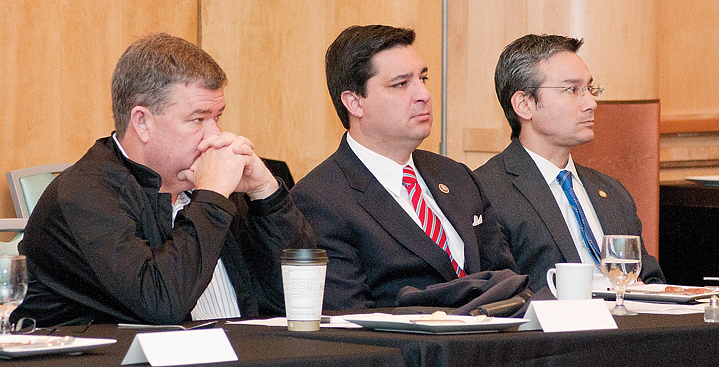The state lawmakers who represent the county heard a request to begin pursuing a state-supported approach to managing the North Carolina coast during a Feb. 20 meeting of leaders from the county, the county’s three beach towns, and the local delegation in Raleigh and Washington.
Securing federal funds for eligible coastal storm damage reduction projects has become increasingly difficult, said New Hanover County Shore Protection Coordinator Layton Bedsole, and new requirements to regularly analyze each project’s costs and benefits might impact New Hanover County’s projects if less likely to receive federal funds.
The U.S. Army Corps of Engineers, which serves as project manager, has been directed to revisit project costs every two years and project benefits every five years to update the benefit-cost ratio for all projects that are eligible for federal funds. To stay federally competitive, projects need a ratio of 2.5, meaning they offer a $2.50 return for every dollar invested. Bedsole said the ratios on file for New Hanover’s projects, calculated with older costs and benefits, are all lower than 2.5.
Two solutions in Raleigh are needed if federal dollars disappear, Bedsole said. Historically, the state only covers 17.5 percent of the project cost if the federal government participates, typically covering 65 percent of the cost. A policy or law is needed to ensure the state will continue contributing to the projects financially without a federal contribution, Bedsole said.
“We need … legislation … that says the state can, could, should, would match local dollars at the same historical percentage that they have matched federal dollars. We need that capability pretty darn quick,” Bedsole said.
If state lawmakers identify a dedicated revenue stream for beach renourishment — like a small percentage of the state gasoline tax, Bedsole suggested — that could allow the state to implement a funding cycle to support renourishment projects in all coastal counties, an approach he said could also prevent competition among coastal communities fighting for any and all available dollars.
“This has to be a regional approach. We see how hard it is to compete with Georgia, Virginia, Delaware, the Gulf states. If the feds go away, we cannot afford to have Carteret fighting with Brunswick, and New Hanover fighting with Dare,” Bedsole said.
Because the Corps gives limited attention to the economic benefits each coastal storm damage reduction project yields when calculating benefit-cost ratios, focusing primarily on beachfront property and less on recreation and tourism, Wrightsville Beach Town Manager Tim Owens suggested the beach towns pursue a more robust economic analysis if the ratios are unfavorable.
“After this benefit-cost ratio is done by the Corps, I think this room needs to consider their own cost-benefit study, at some point, of beach nourishment,” Owens said.
Many people know the multimillion-dollar price tag attached to the storm mitigation projects, Bedsole said, but the county needs to know how much money the strengthened beaches generate.
“We are remiss for not having that number,” Bedsole said, adding that knowing both sides of equation — costs and benefits — could help coastal communities acquire financial support for the projects. “If we can get that economic analysis for each coastal county, that would help our sales pitch.”
A favorable financial analysis could be used by the North Carolina Coastal Caucus, a body of coastal representatives in the N.C. General Assembly that Rep. Rick Catlin, R-New Hanover, said he is helping to revive, to advocate for sustained state support of the projects.
“There isn’t money in Washington. That’s the big problem, and so now, we’ve got to get North Carolina to realize the return on investment. That’s where our coastal caucus is important. We’ve got to work together and be strong, because we’re outnumbered,” Catlin said.
Bedsole agreed the coastal caucus could play an essential role in initiating the conversation outside the borders of New Hanover County.
“They are going to be our voice in Raleigh, the coastal voice from Brunswick to Currituck,” Bedsole said.
The coastal caucus is a useful avenue for tackling coastal issues, said Rep. Ted Davis Jr., R-New Hanover. He agreed a solution is needed to offset waning federal financial support, but noted the state also works with limited resources.
“Of course, the problem is money,” Davis said. He said he would “have a hard time supporting a new tax,” but the more ideal path of laying claim to a portion of a preexisting source of money is difficult when all lawmakers have requests. The prospect of further divvying up the gas tax seems unlikely, Davis continued.
“With all the road projects that need to be done, all the bridges, all the transportation needs — to be realistic, I don’t know how much more of that gas tax we would be able to take away to use for beach renourishment,” Davis said.
Bedsole acknowledged the challenge of finding a sustained revenue stream in Raleigh, but stood by his request to begin talking about state-level solutions.
“It’s uphill. I know it’s uphill,” Bedsole said. “They probably don’t need another economic challenge, but we’ve got to start thinking about it.”
email [email protected]




